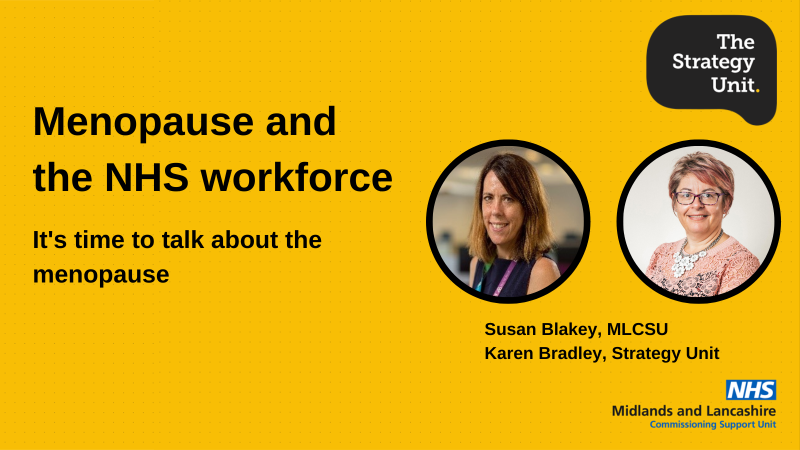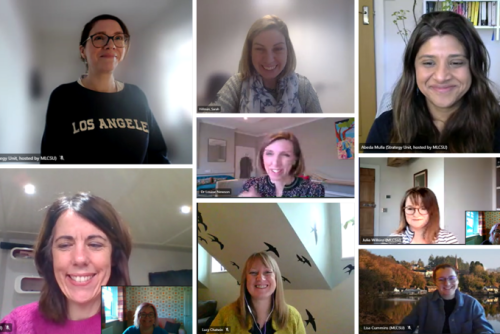To mark International Women’s Day on March 8, Karen Bradley, Principal Consultant at the Strategy Unit, and Susan Blakey, Senior People Consultant at NHS ML, two advisors involved in the recent project, ‘Menopause and the NHS Workforce’, discuss its significance and share what they want to see happen as a result of the published report.
For years, there has been a frustrating narrative around the menopause. Women are expected to quietly get on with it, it’s simply something you have to go through and anyway, it’s just hot sweats and feeling a bit ‘ratty’ isn’t it? The scale of the impact that the menopause can have on someone has been completely underestimated.
How the project came about
A while ago we attended a menopause event together, sparking a conversation that led to us running our own menopause-focused day across the CSU. Encouraging people to take part, we were met with looks of horror from some who replied, ‘but we don’t talk about that!’ Yet the day was a real lightbulb moment for all involved. Some women realised their symptoms, often missed by GPs, were actually related to the menopause. Male colleagues grasped that this affected their partners and co-workers, with some recognising they were managing people who were dealing with these symptoms.
Around the same time, Caroline Criado-Perez, the female activist and campaigner, was in the media talking about how women's health is impacted by a gender gap in healthcare services and medical research. This is also referenced on the International Women’s Day website. So whilst we felt proud of what we had achieved that day, we still had this feeling of injustice and knew we needed to do more.
Following further discussions, Abeda Mulla at the Strategy Unit, came up with the concept to produce this piece of work and pitched it successfully to Derek Kitchen, MD at MLCSU. He wholeheartedly gave it his backing and found the funding for us to conduct the study.
The significance of the report
Now, thanks to a passionate, multidisciplinary, all-female team, led by Abeda, we have a report that, for the first time, describes the extent of how the menopause and its symptoms impacts on a large health and care workforce. The NHS is the biggest employer of women in Europe, with over 1 million (76%) of the total workforce being female. Of these million female employees, over 260,000 are of menopausal age (19%).
The team used a mixed methods analytical approach for the study and this in-depth combination of data analysis and in-person interviews gave us a comprehensive picture. Participants thoroughly engaged with the study and shared their range of symptoms with us, such as brain fog and memory loss, that affected their ability to work. Many stated a crisis of confidence in their roles, of feeling overwhelmed and like an ‘imposter.’
Women also talked about how difficult it can be to manage menopausal symptoms at work. The material and thickness of uniforms makes symptoms, such as hot flushes, hard to manage; access to a toilet, when needed, is problematic for clinical and medical staff, either because they are seeing patients in the community, or they are pressured for time in busy clinics.
All this is what makes the report significant. It brings out into the open what a massive issue the menopause is and how it can be extremely debilitating for some women. These in-person interviews, carried out as part of the study, also show that if you create a safe space where people feel comfortable to talk, they will share their experiences. What is more, women want to talk about the menopause.
Time for action
The NHS has recognised the calibre of the report and welcomed the recommendations it makes, including learning points on uniforms, working hours and access to facilities. It would be wonderful if, in the long run, we saw changes in these areas.
However, whilst recent NHS strategies and guidance are very welcome, and will make a difference, we have also got to look at the culture of the organisation. Every single manager needs to feel comfortable in having conversations about the menopause. They need to be given both the time and skills to have 1-2-1s with their team, but also have the understanding that everyone’s experience of the menopause will be different. There are practical applications that can be taken as an organisation, as a team and at an individual level to be able to do this.
We also want to harness the momentum and interest that the report has created. Let’s champion the report with other CSUs and use our position and specialist skills to shine a spotlight on more areas of women’s health. There is definitely more work to do, including looking at how the menopause disproportionately impacts people with protected characteristics.
Fundamentally, we believe people come to work and want to do a good job but sometimes things can get in the way of that – the menopause being one of the biggest barriers. It impacts not just the women experiencing the symptoms but their families, colleagues and patients. We hope this report is the start of a new narrative and can make inroads into helping the NHS become a better workplace for all.

